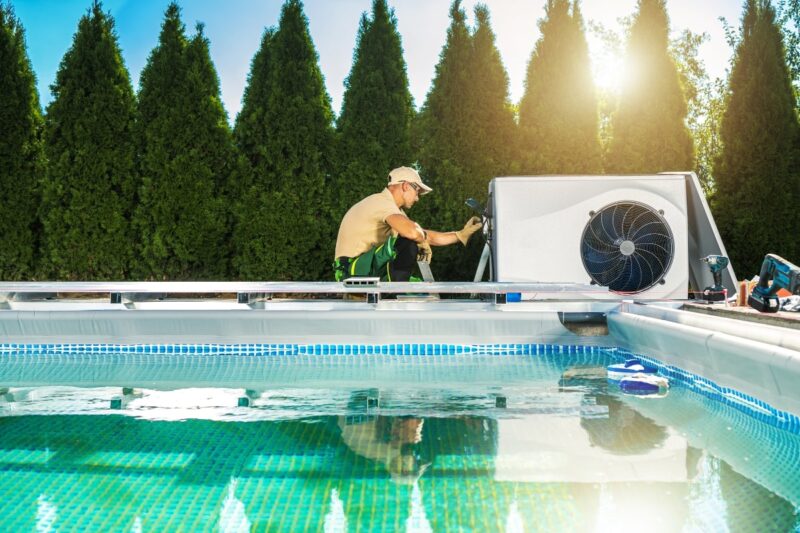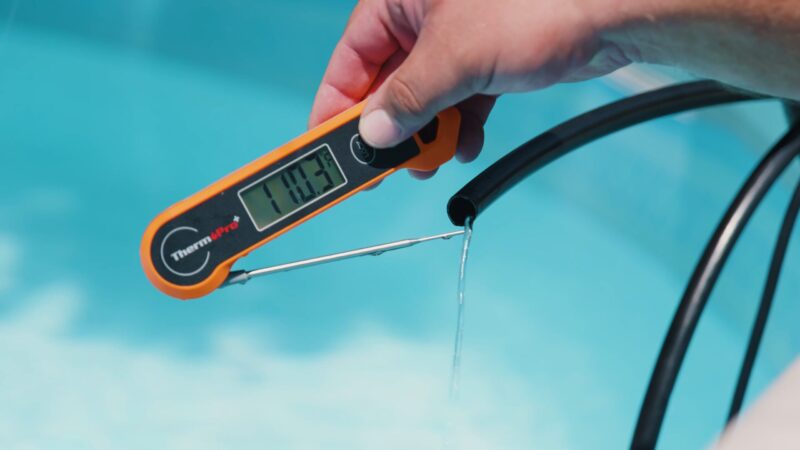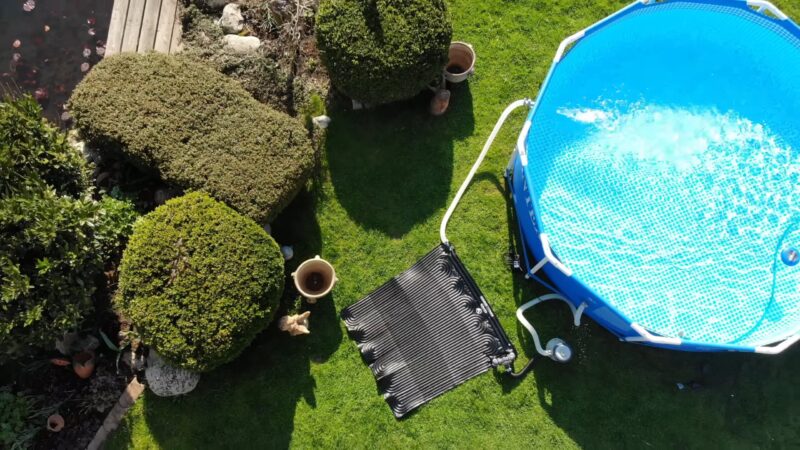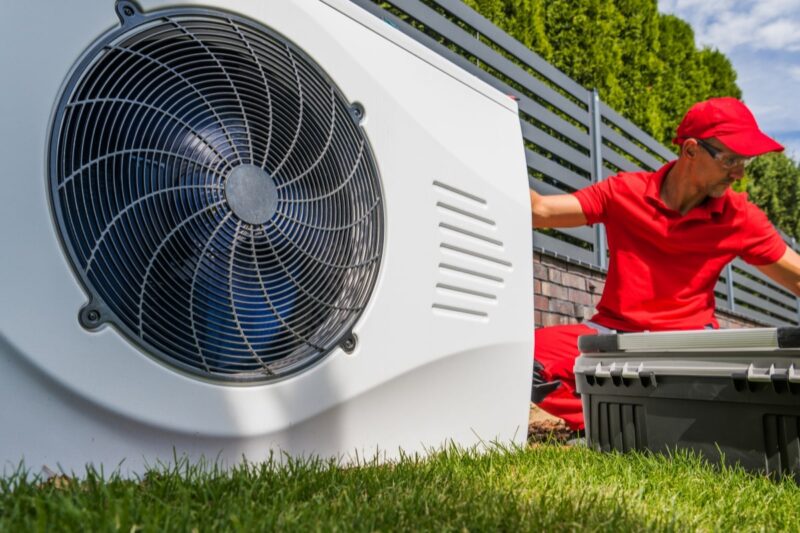Swimming pools are often seen as the epitome of luxury in a home. They offer a private oasis for relaxation, exercise, and entertainment. However, the pleasure of a pool can be significantly diminished if the water is too cold.
This is where pool heaters come into play. But with the costs and considerations associated with them, is a pool heater truly worth the investment? Let’s embark on a deep dive to find out.
Laying the Groundwork
Before delving into the pros and cons, it’s essential to understand the different types of pool heaters available and how they function.
Types of Heaters:
- Gas Heaters: These heaters use propane or natural gas. They are known for their efficiency in heating water quickly. However, the cost of operation can be high, especially with fluctuating gas prices.
- Electric Heaters: Also known as heat pumps, they extract heat from the air, intensify it with a compressor, and then transfer it to the water. They are energy-efficient but might struggle in colder temperatures.
- Solar Heaters: These utilize solar panels to capture heat from the sun and transfer it to the pool. They have minimal operating costs but require a significant initial investment and sunny weather to be effective.
Does Location Dictate Need?

Your geographical location plays a pivotal role in determining the necessity of a pool heater.
- In sun-drenched states like Florida or California, the ambient temperature might naturally keep pool waters warm for most of the year. However, during off-peak months, a heater can ensure year-round usability.
- In contrast, in colder regions like Northern New York or Minneapolis, a pool heater isn’t just a luxury; it’s almost a necessity if you wish to use your pool beyond the brief summer months.
Weather’s Whims

Even in regions known for their consistent and favorable weather, Mother Nature can sometimes throw a curveball. Unexpected cold snaps can drop temperatures drastically within hours, turning your previously warm pool into a chilly basin. Prolonged rainy periods, especially in transitional seasons like spring and fall, can further cool down the pool waters, making them less inviting. Additionally, unseasonal weather events, such as a sudden cold front in the middle of summer, can disrupt the natural warming of your pool.
In such scenarios, a pool without a heater becomes a decorative feature rather than a functional recreational space. However, with a pool heater in place, these weather-induced fluctuations become less of a concern. The heater acts as a protective shield, buffering your pool against these unpredictable temperature drops and ensuring that the water remains at a comfortable temperature. No longer do you have to wait for the sun to reappear or for the weather to stabilize. With a pool heater, your swimming sessions remain uninterrupted, allowing you to enjoy your pool regardless of the weather’s whims.
Extending Pool Use

For many homeowners, a swimming pool is a significant investment, both financially and in terms of the space it occupies. Naturally, one would want to maximize the return on this investment by using the pool as much as possible. However, without a heater, the pool’s usability is often restricted to the peak summer months when the sun is at its zenith, and temperatures are at their highest.
Introducing a pool heater into the equation changes this dynamic entirely. With the ability to regulate water temperature, homeowners can start their swimming season as early as spring, when the first warm days make an appearance. The swimming season can then be extended well into the fall, long after the last summer days have faded. This extended use is not just about quantity but also quality. Early morning swims in spring or late-night dips in autumn have a unique charm, made possible only with the comfort provided by a pool heater.
For those passionate about swimming, be it for exercise, relaxation, or training, this extended season is invaluable. The same holds true for homeowners who love hosting. Pool parties, barbecues by the poolside, or simple family gatherings become events to look forward to throughout the year, rather than just summer activities.
In essence, while the initial cost of a pool heater might seem like an added expense, the benefits it brings in terms of extended usability and enhanced enjoyment can easily justify the investment. For many, the joy of a year-round accessible pool is priceless.
Costs and Considerations
The initial cost of a pool heater can be daunting. However, when viewed as a long-term investment, the benefits often outweigh the initial outlay.
- Operational Costs: While solar heaters have minimal operating costs, gas and electric heaters can add to monthly expenses. However, the comfort and extended usability they offer can make these costs justifiable.
- Maintenance: Regular maintenance can ensure your heater operates efficiently and lasts longer. This might add to the overall cost but is essential for optimal performance.
Weighing the Pros and Cons

Benefits:
- Comfort: A heater ensures the water is always at a comfortable temperature.
- Extended Use: Enjoy your pool for more months each year.
- Property Value: A heated pool can increase your property’s value and appeal.
Drawbacks:
- Initial Investment: The upfront cost can be significant.
- Running Costs: Gas and electric heaters can increase monthly bills.
- Maintenance: Regular upkeep is required to ensure longevity.
Making an Informed Choice
Choosing the right pool heater depends on various factors, including your location, pool usage patterns, and budget. It’s essential to consult with professionals, consider all options, and make an informed decision.
FAQs
What are the different types of pool heaters available?
There are primarily three types of pool heaters: gas heaters, electric heaters (or heat pumps), and solar heaters. Each has its own advantages and disadvantages, depending on your location, budget, and pool usage patterns.
How much does it cost to install and operate a pool heater?
The initial installation cost of a pool heater can range between $1,000 and $5,000, depending on the type and brand. Operational costs vary: solar heaters have minimal operating costs, gas heaters can be more expensive due to fluctuating gas prices, and electric heaters are generally cost-effective once they reach the desired temperature.
Is a pool heater necessary if I live in a warm climate?
While warm climates naturally keep pool waters at a comfortable temperature for most of the year, a heater can be beneficial during off-peak months or unexpected cold snaps. It ensures year-round usability and comfort.
How long can I extend my swimming season with a pool heater?
A pool heater can effectively extend your swimming season by several months. Instead of just the summer months, you could enjoy your pool from early spring to late autumn, depending on your location.
Are there any environmental concerns with using a pool heater?
Solar heaters are the most environmentally friendly option as they utilize renewable energy. Gas heaters emit greenhouse gases, but newer models are more efficient and eco-friendly. Electric heaters are considered energy-efficient, especially when paired with green energy sources.
How often will I need to maintain my pool heater?
Regular maintenance ensures optimal performance and longevity for your pool heater. While solar heaters require minimal upkeep, gas and electric heaters should be checked annually by professionals to ensure they operate efficiently and safely.
Conclusion
The allure of a swimming pool isn’t just in its sparkling waters but in the promise of relaxation, recreation, and respite it offers. However, to truly harness this promise year-round, a pool heater emerges as an unsung hero. Beyond just warming waters, it extends memories, laughter, and moments of tranquility across seasons.
Whether you’re an avid swimmer chasing the thrill of the early morning laps in spring or a family looking to host memorable poolside gatherings in autumn, a pool heater ensures that the charm of your pool remains undiminished, come rain or shine. So, as we reflect on the myriad benefits of pool heaters, one thing becomes clear: in the quest for uninterrupted aquatic joy, investing in a pool heater is not just a choice, but a cherished addition to the poolside experience. Dive in and embrace the warmth!
